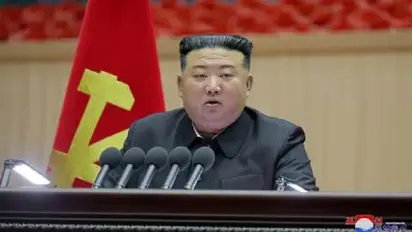North Korea fires volley of short-range ballistic missiles at Seoul following thrash-filled balloon incident

Synopsis
This launch comes on the heels of North Korea's failed attempt on Monday to put a second spy satellite into orbit, which followed a rare summit between Seoul, Beijing, and Tokyo that urged Pyongyang to abandon its nuclear ambitions.
North Korea fired a salvo of short-range ballistic missiles early Thursday, according to Seoul's military, just hours after Pyongyang sent hundreds of trash-filled balloons across the border as a punitive measure against South Korea. This launch comes on the heels of North Korea's failed attempt on Monday to put a second spy satellite into orbit, which followed a rare summit between Seoul, Beijing, and Tokyo that urged Pyongyang to abandon its nuclear ambitions.
Kim Jong Un's powerful sister referred to the balloon barrage, reportedly filled with animal feces, as "sincere presents" for the South in a statement on Thursday, justifying it as retaliation for anti-Kim propaganda sent northward by activists.
North Korea also responded to the UN Security Council, which is set to hold a meeting on Friday to discuss the failed satellite launch, a violation of multiple UN sanctions on Pyongyang's use of ballistic technology.
Early Thursday, Seoul's military reported detecting the launch of "around 10 short-range ballistic missiles" fired into waters east of the Korean peninsula. According to Seoul's Joint Chiefs of Staff, the missiles traveled approximately 350 kilometers (217 miles). They labeled the launch a "provocation" and stated that they were analyzing the specifics in collaboration with the United States and Japan.
Japan also confirmed the launch, with Prime Minister Fumio Kishida informing reporters that the ballistic missiles "appeared to have fallen outside of Japan's Exclusive Economic Zone."
Tokyo "strongly condemns" the launch, Prime Minister Kishida said, adding that they had already lodged a protest.
Kishida had been in Seoul on Monday to meet South Korean President Yoon Suk Yeol and Chinese Premier Li Qiang for the first trilateral summit since 2019, where they reaffirmed their commitment to the "denuclearization of the Korean Peninsula."
North Korea responded by declaring that even discussing denuclearization was a "grave provocation" and a violation of its constitution, which was amended in 2023 to enshrine its status as a nuclear state.
Just hours after the summit, North Korea conducted its failed satellite launch, which drew widespread condemnation from Washington, Seoul, and Tokyo. Subsequently, on Tuesday night, Pyongyang sent balloons across the border before firing its salvo of ballistic missiles on Thursday.
"It is unprecedented that such a large number of short-range missiles were fired simultaneously," Hong Min, a senior analyst at the Korea Institute for National Unification in Seoul, told AFP.
"It appears to be the North's protest of the 'denuclearisation' pledge agreed at the three-way summit and the calling for the UN Security Council meeting to discuss its satellite launch," Hong said, calling it a "tit for tat approach".
All signs indicate "this decision was made at the highest decision-making body," he added.
Analysts note a substantial technological crossover between space launch capabilities and the advancement of ballistic missiles.
For Kim's regime, placing a reconnaissance satellite into orbit has been a paramount objective, with claims of success in November following two failed attempts the previous year.
However, Pyongyang reported that the rocket carrying its "Malligyong-1-1" reconnaissance satellite exploded shortly after launch, believed to be due to an engine malfunction.
In a speech released by the official Korean Central News Agency late Wednesday, North Korean leader Kim Jong Un affirmed his country's unwavering determination.
"Although we failed to achieve the results we had hoped to get in the recent reconnaissance satellite launch, we must never feel scared or dispirited but make still greater efforts," he said.
"It is natural that one learns more and makes greater progress after experiencing failure," he said, according to the transcript of the speech, given at the Academy of Defence Sciences.
On Thursday, North Korea issued a statement branding UN Secretary-General Antonio Guterres as "the most spiritless and weak-willed secretary-general in the history of the United Nations," ahead of the UN Security Council meeting regarding the launch.
Pyongyang expressed "deep concern" over the UNSC's decision to convene an open meeting to scrutinize the legitimacy of North Korea's satellite launch, stated Kim Son Gyong, a North Korean foreign ministry official.
According to North Korea, "the launch of a military reconnaissance satellite is an unavoidable measure to strengthen self-defense capabilities," he emphasized.
Seoul alleges that Kim received technical assistance from Russia for its successful November launch in exchange for sending containers of weapons to Moscow for use in Ukraine.
Check the Breaking News Today and Latest News from across India and around the world. Stay updated with the latest World News and global developments from politics to economy and current affairs. Get in-depth coverage of China News, Europe News, Pakistan News, and South Asia News, along with top headlines from the UK and US. Follow expert analysis, international trends, and breaking updates from around the globe. Download the Asianet News Official App from the Android Play Store and iPhone App Store for accurate and timely news updates anytime, anywhere.